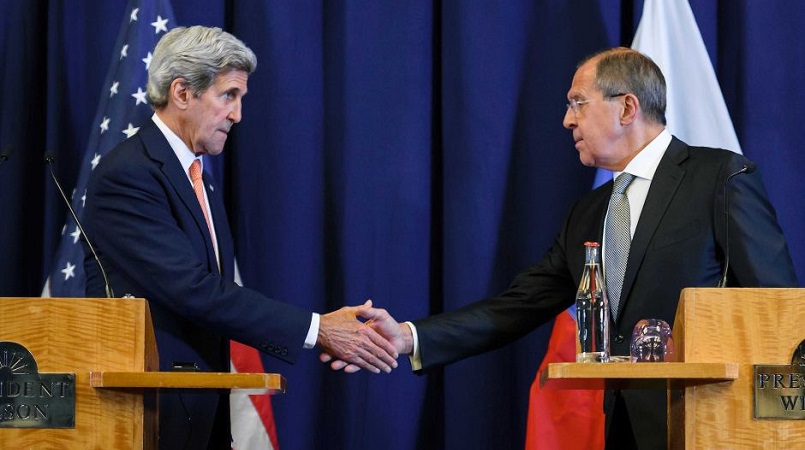
The United States and Russia have hailed a breakthrough deal to put Syria's peace process back on track, including a nationwide ceasefire, improved aid access and the joint targeting of banned militant Islamist groups.
After a day of marathon talks in Geneva, US Secretary of State John Kerry and Russia's Foreign Minister Sergei Lavrov announced the truce, which is set to come into force on Monday (local time), the first day of the Muslim holiday of Eid.
Mr Kerry said he believed the plan would lead to talks to "stop the conflict" which has raged for more than five years, killing more than 290,000 people and displacing millions.
He called on "every Syrian stakeholder" to support the plan to "bring this catastrophic conflict to the quickest possible end through a political process".
Mr Lavrov said despite continuing mistrust, the two sides had developed five documents that would enable coordination of the fight against terrorism and a revival of Syria's failed truce in an enhanced form.
"This all creates the necessary conditions for resumption of the political process which has been stalling for a long time," he said.
Mr Kerry said the "bedrock" of the deal was an agreement that the Syrian Government would not fly combat missions in an agreed area, on the pretext of hunting fighters from the banned Nusra Front, an Al Qaeda affiliate in Syria.
"That should put an end to the barrel bombs, and an end to the indiscriminate bombing, and it has the potential to change the nature of the conflict," he said.
Mr Lavrov said if the ceasefire lasted a week, US and Russian forces would carry out joint air strikes to target the Nusra Front and Islamic State (IS) groups.
"We will jointly agree on strikes against terrorists to be carried out by the Russian and American air forces," Mr Lavrov said.
"We have agreed on the zones in which these strikes will be carried out."
Powers join forces to fight terrorism
The two world powers back opposite sides in the civil war, with Moscow supporting Bashar al-Assad's Government and Washington behind a coalition of rebel groups it regards as moderate.
The Americans and their allies have been insisting that Syrian regime forces, accused of widespread civilian massacres, must stand down.
US President Barack Obama and his Russian counterpart Vladimir Putin had previously held "productive" talks about achieving peace in Syria at the G20 Summit, but they ended without agreement.
Mr Kerry said all sides in the conflict would need to adhere to the nationwide truce.
"This requires halting all attacks, including aerial bombardments, and any attempts to gain additional territory at the expense of the parties to the cessation," he said.
"It requires unimpeded and sustained humanitarian access to all of the besieged and hard-to-reach areas including Aleppo."
Both warring sides would pull back from the strategic Castello Road in Aleppo to create a demilitarised zone, while opposition and government groups would both have to provide safe and unhindered access via Ramouseh in the south of the city.
Aleppo fighting continues
The United Nations said on Friday the Syrian Government had effectively stopped aid convoys this month and Aleppo was close to running out of fuel, making the talks even more urgent.
The announcement of a deal came as resurgent Syrian regime forces tightened the noose around the beleaguered city.
Pro-regime forces have taken back a strategically important district on Aleppo's southern outskirts, rolling back nearly every gain from a month-long rebel offensive there.
The Government advance further sealed off Aleppo's opposition-held eastern districts, and regime troops backed by the Russian air force have completely encircled opposition-held neighbourhoods.
In another major blow to the rebels, the military commander of the Army of Conquest, the largest rebel alliance, was killed in an air strike, Islamist sources said.
"Rebels are now back to square one, under an even more ruthless siege," head of the Syrian Observatory for Human Rights Rami Abdel Rahman said.
In Aleppo, desperate civilians described a battle for survival. One Aleppo shopper, Omar al-Beik, said "this siege is much harder" than the first one.
"During the first one, there were at least some products still in the market — now there's nothing at all," he said. "No products, no vegetables, no sugar. Nothing."
AFP/Reuters
